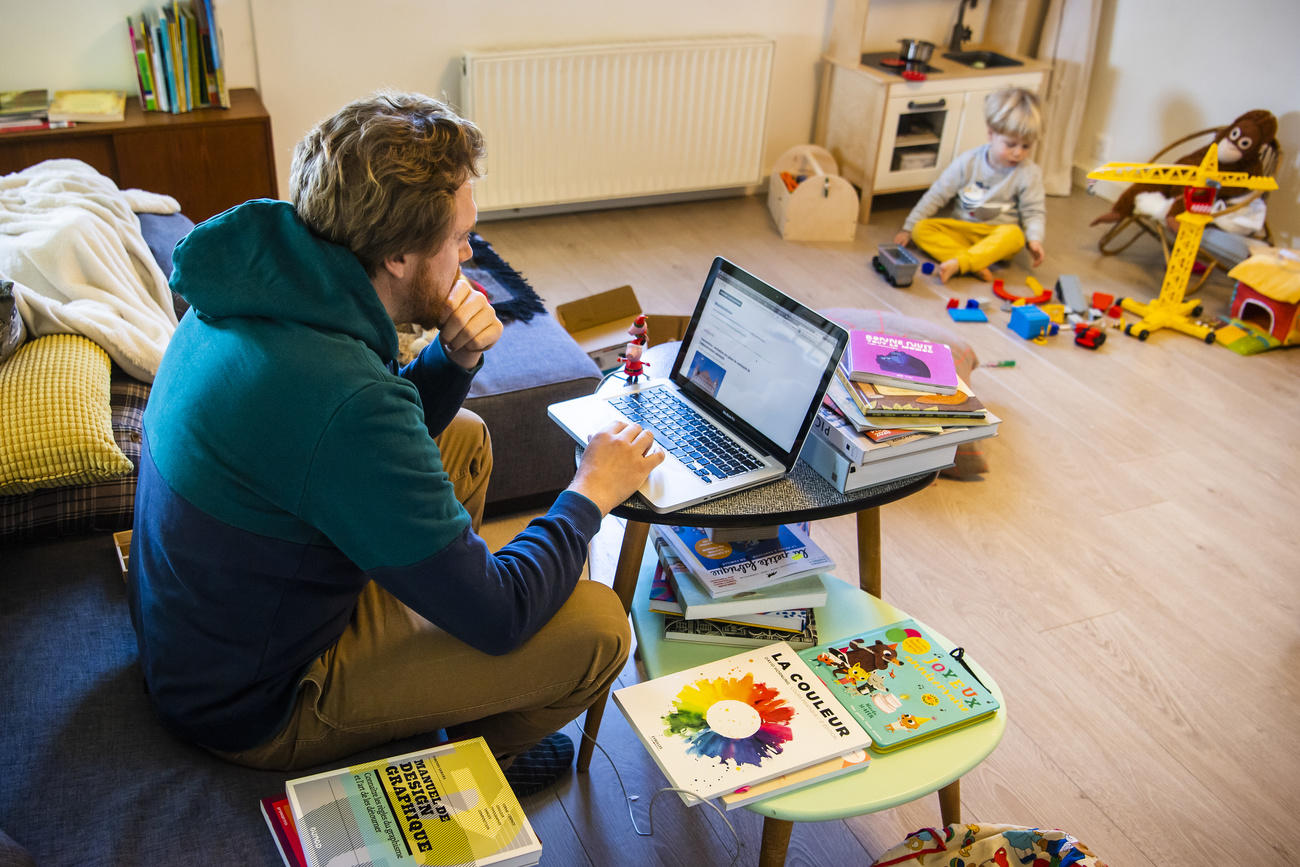Pandemic triggers debate over home office rules, compensation

The coronavirus pandemic led an unprecedented number of people to work from home in Switzerland, raising questions over laws applying to home office. Of renewed interest is a 2019 federal court ruling that employers must contribute to employees’ rent payments if they are required to work from home. When is this applicable?
“This decision mainly shows that the responsibilities that the employer or the company has [towards employees] also apply to telework,” says Christine Michel, health and safety officer at the Unia interprofessional trade union, Switzerland’s largest labour union.. “The employer continues to be responsible for their health, ensuring that ergonomic conditions are met, that they can take breaks, and that working hours are respected. [Telework] can’t be a cost- saving programme.”

More
Companies must pay share of rent for employees working from home
We spoke to labour law experts Kurt Pärli of the University of Basel and Thomas Geiser of the University of St Gallen to clarify the implications of this ruling and other questions surrounding home office in the era of Covid-19.
swissinfo.ch: What are the implication of this ruling right now, amid the coronavirus pandemic where so many people were ordered to home office by the government and employers?
Kurt Pärli: In this ruling, the Federal Supreme Court made it clear that the employer must co-fund the rent for a workroom in the employee’s home. A contractual agreement on this is not necessary; the obligation to pay the costs is derived from a provision in Swiss employment contract law (Art. 327)). It is important to note that employers are not obliged to pay if a workplace is available in the company and the home office is requested by the employee.
If employees are only temporarily working in a home office because of the acute crisis, there is most cases no obligation for the employer to take over rental costs. The situation is different if the employee had to rent an additional room for the home office or, for example, had to use a room for work that was normally rented to other people.
The judgment is only binding for this individual case. However, all employees who are permanently and not only temporarily working in home office on demand of the employer can claim compensation from the employer.
Thomas Geiser: At the moment, the situation is a bit delicate, because the government has not forced people to work remotely. The Federal Council decision stipulates that some people, those who are at risk, may do so. And if this is not possible for one reason or another, the employer can also ask them to work on-site if the hygiene recommendations from the Federal Health Office can be guaranteed..
It’s not so clear whether an employee can now, for this period of one or two months, ask the employer to pay something for the rent. It would depend on the specific situation.
swissinfo.ch: How do rent allowances from employers work in practice?
K.P: In many cases, home office arrangements are set out in the employment contract, which is also highly recommended. Issues to be regulated are the share of the costs for rent, internet connection, printer paper and, if necessary, an office chair or similar things. In the absence of a contractual provision, Art. 327 of the Swiss Code of Obligations is decisive; the provision states that the employer must bear the necessary expenses for the performance of the work.
In principle, if the employer decides to ask the employee to set up a home office, and also if the company does not have enough work space, the employer must pay for the costs of the home office.
T.G: It’s always up to the party who wants something to ask the other to pay for it. Indeed, good practice is to stipulate a certain amount for that in the employment contract, also because the employer must know in principle what the employee costs. Otherwise, it is impossible for the company to make economic calculations.
swissinfo.ch: How is the amount determined?
K.P: The principle is: if the space can also be used privately, then the costs must be shared. This was also the case in the facts of the 2019 Federal Supreme Court ruling.
T.G.: Here lies the real problem. This is where the parties must discuss and find a solution together.
Of course, it also depends on what is suitable for the job, for the position of this person. It’s obvious that someone who does programming for computers probably needs a different kind of setting than someone who, for example, has to receive clients at home.
swissinfo.ch: Does this affect a company’s willingness to allow home office?
K.P: I don’t think so, in many companies it is already possible to work [part time] from home. This affects the amount of office space required in the company. The experience with home offices during the corona crisis will lead to an even greater spread of the practice. The law sets the framework for ensuring that the costs do not have to be borne unilaterally by the employees
swissinfo.ch: How do employers ensure their workers are productive during home office?
K.P: The employer is entitled and, under the Labour Code, even obliged to monitor the working time of employees, including in the home office. Even in the home office, the prohibitions on nighttime and Sunday work as laid down in the Labour Code may not be violated.
Home offices carry risks for both employers and employees. For employers, there is a particular risk that the confidentiality of company data in the home office is not guaranteed. Here the employees must be very careful. For the employee there is the danger in the home office that not only his work but also his private activities are monitored. Clear contractual rules are required here.
T.G: All the time an employee makes available to the company, to his employer, counts as working hours. If you are working in the company premises the question of whether you are getting your work done or reading the newspaper also comes up. You always have the impression that when the work is done at home you can’t control it and if it’s in the office you can control it. That’s a mistake.
swissinfo.ch: Can an employee do home office from abroad?
K.P: This is a delicate problem, since insurance law questions may arise. If the employee is an EU/EFTA or Swiss citizen resident in the EU/EFTA and his or her home office workload is more than 25%it should be noted that he or she is subject to the social security law of the country of residence and the Swiss employer must pay social security contributions there. In the case of cross-border employment relationships, it may therefore be necessary to limit home office work to a low workload, i.e. below 25%.
If, however, cross-border commuters temporarily worked in the home office during the corona crisis, this did not lead to a change in the social security subordination. A home office of more than 25% would have to be the normal situation, and only then would there be a change of status with regard to social security.
The Swiss Employers’ Association, for its part, notes that in most cases, the employee has a fixed workplace at his or her disposal. Home office can supplement the work on site and therefore usually does not lead to necessary additional expenses for the employee. However, if the employee, in agreement with the employer, provides equipment and materials for the performance of the work, compensation can be agreed. This also applies in the current corona crisis.”
The Association points out that not all jobs are viable with home office arrangements.
The Swiss State Secretariat for Economic Affairs (SECO)External link offers an overview of the rights and obligations of employees and employers when teleworking.

More
Telework likely to continue after Covid-19, but not on a large scale

In compliance with the JTI standards
More: SWI swissinfo.ch certified by the Journalism Trust Initiative













You can find an overview of ongoing debates with our journalists here . Please join us!
If you want to start a conversation about a topic raised in this article or want to report factual errors, email us at english@swissinfo.ch.